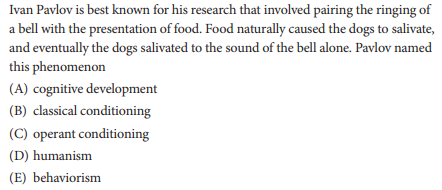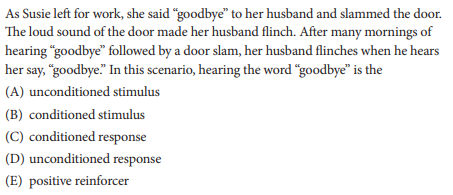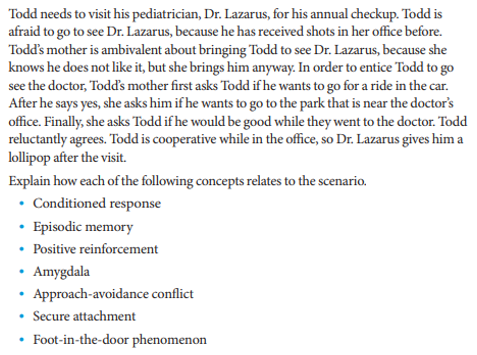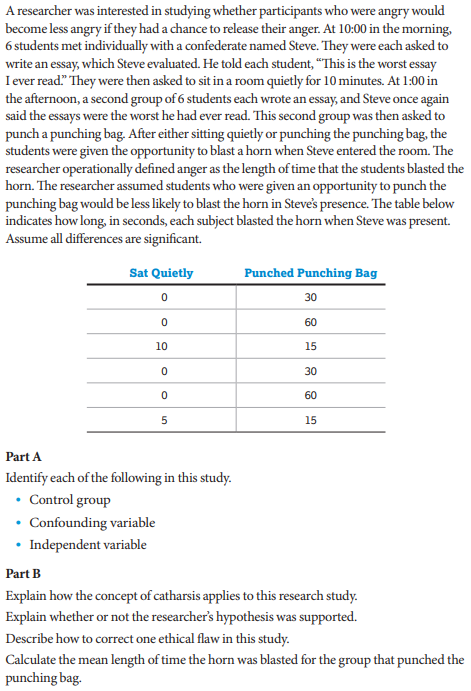Ultimate Guide to the AP Psychology Exam
The AP Psychology exam is one of the most popular APs among traditional students and self-studiers alike. Although many students enroll in the class, this particular exam is also well-suited to self-studying due to its heavy emphasis on vocabulary and highly specific theory. If you are interested in taking the AP Psychology exam, whether you have taken the class or have self-studied, read on for a breakdown of the test and CollegeVine’s advice for how to best prepare it. On Tuesday, May 12, at 12 pm, the College Board will hold the 2020 AP Psychology Exam. For a comprehensive listing of all the AP exam times, check out our post, 2020 AP Exam Schedule: Everything You Need to Know. The AP Psychology course explores concepts, theories, and behaviors associated with the field and research areas of psychology. Successful students will become familiar with the history of the field, past and current research methods, and the biological and emotional bases for behavior. Because psychology is a rapidly-changing field, students should ensure that they prepare for the test with the most current materials available. The AP Psychology exam tests your mastery of both skills and concepts. During the course, you will develop three skills critical for passing the exam. Those skills and the weight they’re given on the AP Psychology exam are: The concepts tested on the AP Psychology exam are broken into nine units, focusing on the core principles, theories, and processes of the discipline. Below is a suggested structure of the nine units from the College Board along with the weight each unit is given on the AP Psychology exam: The AP Psychology exam is one of the shortest AP exams, clocking in at just two hours, and comprises two sections. The first section features multiple-choice questions and the second section is made up of free response questions. Section 1: Multiple Choice 1 hour 10 minutes | 100 questions | 66.7% of score Section one takes one hour and 10 minutes, contains 100 multiple-choice questions, and accounts for 66.7% of your total score. You’ll encounter two distinct types of multiple-choice questions: you’ll either be asked to define and explain content from the course topics or apply skills of concept understanding, data analysis, and scientific investigation. Example of a multiple-choice question asking you to define a course topic: The answer to the multiple-choice questions above is B. Example of a multiple-choice question asking you to apply a course concept: The answer to the multiple-choice questions above is B. Section 2: Free Response 50 minutes | 2 questions | 33.3% of score The second section takes 50 minutes, contains two free response questions, and accounts for 33.3% of your score. The first of the free response questions tests your grasp of the first course skill, concept understanding, and tasks you with explaining behavior and applying theories and perspectives to real-world situations. The second of the free response questions requires you to demonstrate possession of all three course skills with an emphasis on scientific investigation. On the second free response question, you’ll analyze research studies—including reviewing and interpreting quantitative data. Example of a concept understanding free response question: Example of a scientific investigation multiple-choice free response question: In 2019, 64.5% of students who took the AP Psychology exam received a score of 3 or higher. 20.5% of students received the top score of 5, while 22% scored a 1 on the exam. Keep in mind that credit and advanced standing based on AP scores varies widely from college to college. While a 3 is generally considered passing, you may need a 4 or 5 to receive credit. Some schools don’t grant credit at all, and only use AP exams for placement. You can find regulations regarding which AP exams qualify for course credits or advanced placement at specific colleges on the College Board’s website. A full course description that can help to guide your studying can be found in the College Board AP Psych course description. If you’re curious about other score distributions, see our post Easiest and Hardest AP Exams. Take a practice test to assess your initial knowledge of the material. Although the College Board’s AP Psychology website provides a number of sample test questions, it does not provide a complete sample test. There are, however, four complete practice tests with scoring guides provided on the College Board AP Psychology teacher website—from 1994, 1999, 2012, and 2016. You can also find a practice test in many of the commercial study guides, and some even include a diagnostic test to act as your initial assessment. Once you have taken some kind of formative assessment, score it to identify the areas you already understand and those in need of improvement. It can be helpful to have a teacher or friend score your free response essays, as these are more subjective than the multiple-choice section. From an accurate practice test, you will get a better idea of where to focus your studying efforts. In order to ace the AP Psychology exam, you will need to master the basic history of psychology along with the fundamental theories and approaches covered in the nine course units. You will likely need some study resources to help you as you tackle this content. The Myers’ Psychology For AP textbook is said to be the most comprehensive guide, as it is designed specifically for the AP class. Some criticize it for having too much information and for being particularly expensive, but it does cover all of the theory necessary to study for the exam in-depth. For information that is presented more concisely, you might consider Barron’s AP Psychology 8th Edition study guide. There are also accompanying Barron’s AP Psychology flashcards available. In addition, there are tons of study resources available online, including many from AP teachers who have posted comprehensive outlines and study guides. There is also a great 40-episode YouTube series focused on the AP Psychology Exam. Additionally, a convenient way to study is to use one of the recently-developed apps for AP exams. Make sure you read reviews before choosing one, as their quality varies widely. The Brainscape AP Psych app and Varsity Tutors app are free, and both have positive reviews. Once you have your theory down, test it out by practicing multiple-choice questions. You can find these in most study guides or through online searches. You could also try taking the multiple-choice section of a practice exam. Many sample questions with answers and explanations can be found in the official course description. Varsity Tutors offer numerous free AP Psychology diagnostic tests which contain an abundance of multiple-choice questions to practice with. Study.com also provides a free 50-question practice test. Try to keep track of which concepts and vocabulary are still tripping you up, and go back over this material. On the AP Psychology exam’s free response section, you should be prepared to make practical use of your theory. Familiarize yourself with how to apply the most common principles from the field, and know how to effectively design or evaluate a research study. To effectively master the free response section of your AP Psychology exam, you should have a good understanding of what task verbs you will commonly encounter, and precisely what each is asking you to do. The College Board provides the following definitions for the most commonly encountered directives on this exam: Before you begin writing, make a brief, strong outline. It will not count toward your score, but it will help to organize your thoughts. Try to include specific examples from your studying and make sure to clearly introduce them in your writing. Common ways to successfully highlight specific examples include “For example,” or “One example of this is…” The best way to prepare for the free response prompts is to practice them and study the scoring examples provided by the College Board. The College Board has the free response questions used on the AP Psychology exam dating back to 1999 posted on their website. These authentic student responses with real scoring explanations should give you a good idea of how the free response questions are scored, and where points are commonly lost. As you did at the very beginning of your studying, take a practice test to evaluate your progress. You should see a steady progression of knowledge you’ve accumulated, and it’s likely that you will see patterns identifying which areas have improved the most and which areas still need improvement. If you have time, repeat each of the steps above to incrementally increase your score. If you’re taking the AP course associated with this exam, your teacher will walk you through how to register. If you’re self-studying, check out our blog post How to Self-Register for AP Exams. For information about what to bring to the exam, see our post What Should I Bring to My AP Exam (And What Should I Definitely Leave at Home)? Balancing challenging coursework like AP classes, time-consuming extracurricular activities, and social obligations is stressful—don’t let college admissions stress you out even more! CollegeVine’s free chancing engine takes the mystery out of admissions, letting you know your odds of acceptance at over 500 schools, and giving you advice to improve your profile. Sign up for your CollegeVine account today to get a boost on your college journey! For more guidance about the AP exams, check out these other informative articles: Want access to expert college guidance — for free? When you create your free CollegeVine account, you will find out your real admissions chances, build a best-fit school list, learn how to improve your profile, and get your questions answered by experts and peers—all for free. Sign up for your CollegeVine account today to get a boost on your college journey.
When is the AP Psychology Exam?
About the AP Psychology Exam
Course Skill
Description
Percentage of Exam Score (Multiple-Choice Section)
Understanding Concepts
Define, explain, and apply concepts, behavior, theories, and perspectives.
75%-80%
Data Analysis
Analyze and interpret quantitative data.
8%-12%
Scientific Investigation
Analyze psychological research studies.
12%-16%
Course Unit
Percentage of Exam Score (Multiple-Choice Section)
Scientific Foundations of Psychology
10%-14%
Biological Bases of Behavior
8%-10%
Sensation and Perception
6%–8%
Learning
7%-9%
Cognitive Psychology
13%-17%
Developmental Psychology
7%-9%
Motivation, Emotion, and Personality
11%–15%
Clinical Psychology
12%–16%
Social Psychology
8%–10%
AP Psychology Exam Content




AP Psychology Score Distribution, Average Score, and Passing Rate
Exam
5
4
3
2
1
AP Psychology
20.5%
25.3%
18.7%
13.5%
22%
Best Ways to Study for the AP Psychology Exam
Step 1: Assess Your Skills
Step 2: Study the Theory
Step 3: Practice Multiple-Choice Questions
Step 4: Practice Free Response Questions
Step 5: Take Another Practice Test
Step 6: Exam Day Specifics





